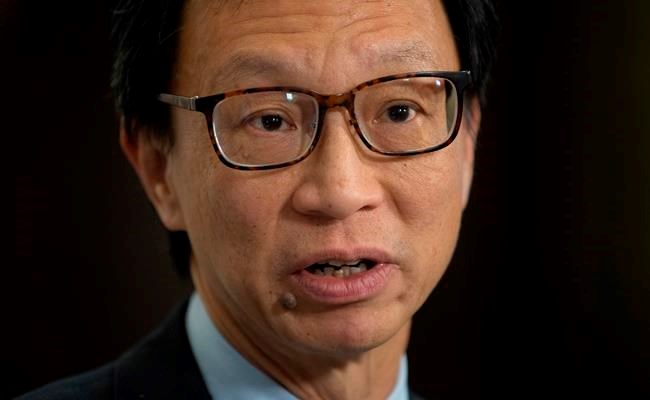Senator Yuen Pau Woo questions whether a foreign influence registry might become "a modern form of Chinese exclusion," and says angry reaction to his suggestion proves his point about racial profiling and stigmatization.
But some activists who were involved in campaigns to right the wrongs of ÎÚÑ»´«Ã½'s head tax on Chinese immigrants and the Chinese Immigration Act of 1923 — also known as the Chinese exclusion act — strongly dispute the comparison.
"I can't see how he can complete his statement with a straight face," said Bill Chu, a veteran Vancouver activist who campaigned for head tax redress.
Woo drew a link between the historic wrongs against Chinese immigrants in a Tweet on Friday, comparing it with efforts to create a foreign influence transparency registry.
"100 years ago, as part of the Chinese Exclusion Act, ÎÚÑ»´«Ã½ forced all Chinese people in the country to register or face deportation," Woo said. "How can we prevent this registry from becoming modern form of Chinese exclusion?"
He said such efforts were "not the answer" and it was "time to speak out."
Woo said a private member's bill seeking to establish a foreign influence registry, S-237, would "require anyone with ties to an organization that could be under the direction" of foreign governments to register in order to contact Canadian public officials.
David Wong is a Vancouver architect and activist for redress whose grandfather and great-grandfather were separated due to the Chinese Immigration Act, which effectively barred Chinese immigration until 1947.
He said Woo's comparisons were "odious."
"I just can't accept that from a person who's done nothing except to use our common Chinese ancestry as a way to leverage this sort of history towards whatever he's trying to do right now," Wong said.
Wong said he was concerned comments like Woo's give "ammunition" to racist sentiment and undo the work of Chinese Canadians against historic wrongs and racism.
Woo said in an interview that some of the responses he has received demonstrates his point, that laws to combat foreign influence should not "punish or stigmatize certain communities, stifle legitimate political debate and foster parochialism."
"You see how many of my followers (on Twitter) have reached the conclusion that I should be the first to register?" Woo said about a foreign influence registry.
"And they are doing that not on the basis of whether I'm in fact subject to any foreign influence but based on the views I hold."
While Woo said he is open to the idea of a registry, there had to be a "material" demonstration of foreign influence, and it should not divide "Chinese Canadians into those who are acceptable and unacceptable."
Simon Fraser University professor and city program director Andy Yan's great-grandfather paid the head tax that was levied on Chinese immigrants over decades.
Yan, who was also active in redress campaigns, said he considered Woo's remarks reflective of a political strategy to use race to deflect attention from critical issues.
The urban planning researcher said recent debates about Vancouver's empty home tax and foreign buyer bans have sparked similar responses.
"It's trying to conjure a racial panic while failing to recognize a multicultural, multi-ethnic reality of ÎÚÑ»´«Ã½," Yan said, adding that he considered it "disrespectful to what my great-grandfather went through."
In 2006, then prime minister Stephen Harper formally apologized to Chinese Canadians for the head tax and offered payment of $20,000 to roughly 400 survivors or their widows.
Allegations that China meddled in the recent federal elections have dominated political debate for weeks, after a series of media reports published by the Globe and Mail newspaper and Global News.
Woo said it was part of his job to meet foreign government officials from China and other countries, and he was concerned that the current focus on foreign interference is detrimental to Canadian officials' ability to do their work.
"I shouldn't have to feel any pressure," Woo said of public scrutiny on meeting foreign representatives. "It's part and parcel of my job. But the recent reckless allegations … have given pause to many of us about whether what we consider the normal course of meeting with official with other countries is unacceptable."
Wong said there could be a risk of guilt by association in being seen with Chinese diplomats, and "a lot of it is quite innocent."
"But people should do more homework before showing up at an event," he added.
Chu said anyone worried about being improperly tainted should ask "who caused this misunderstanding towards the entire Chinese community."
"There's obviously the historical or systematic racism," he said. "But that's not what we are talking about."
"There's new type of concern with China that's of a different nature altogether."
This report by The Canadian Press was first published March 14, 2023.
Chuck Chiang, The Canadian Press



